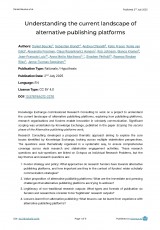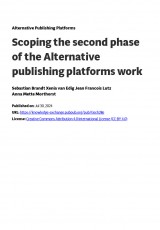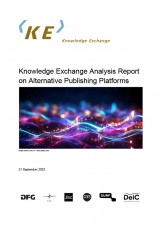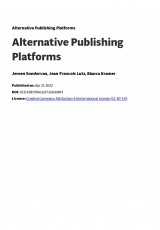
Are you confused by all the 'alternative' scholarly publishing platforms that have emerged over recent years? Today there seem to be so many ways to communicate or disseminate research. There are not only peer-reviewed academic articles, monographs, conference proceedings, or theses. Now there are also preprint repositories, data journals, specialist data and code repositories, trials registries, scholarly blogs and websites, many forms of peer review and micropublications. These different forms of publication all have different aims, such as seeking to remove the barriers, constraints and costs imposed by legacy academic publishing companies, to reduce questionable practices, or make research work more deeply accessible and reusable.
Alternative Publishing Platforms (Phase 1)
The Alternative Publishing Platforms Scoping Paper
In order to help guide conversations about the merits and downsides of these different 'alternative' publishing platforms, a Task and Finish Group worked on a (KE) scoping paper (DOI:10.21428/996e2e37.3ebdc864). The hope is that we can develop a taxonomy of these various platforms - platforms that follow different paths (e.g. in equitable publishing models, quality control, technical features, open source, iterative publishing workflows, etc.) compared to the legacy publishers. Such platforms represent a move away from the traditional journal as an organising principle and might differ from traditional scholarly journals in a number of ways, including publication process, governance, and underlying infrastructure. They can be regarded as examples of real innovative, open access scholarly communication or as effective "threat infrastructures" to traditional journal publishers. Knowing the directions in which these platforms are driving innovation, and their different aims, might allow us insight into what can be a confusing landscape.
Feedback was welcomed on our scoping paper and the developing taxonomy. All stakeholders, including researchers, institutions, funders and (non profit) publishers were invited to comment and provide feedback.
A French language version of the scoping paper is also available here
Survey: Call for entries
The next step was a call for entries to further explore alternative publishing platforms and better understand what they do and how they can be placed in the open scholarly communication ecosystem. Platforms working in open access, publishing and communication who wish to be included in a KE taxonomy of Alternative Publishing Platforms were invited to answer this call for entries. This call for entries remains open and if you are an alternative platform and wish to complete the survey, your contribution will be of great value. Click here to provide your feedback.
In total, there are 25 survey questions. These range from the types of research disciplines the platforms are designed for, what governance structure they follow, who owns them through to what functions they cover, publication types encompassed and when they publish research.
Analysis Report on Alternative Publishing Platforms
In September 2023, we published a report which shares the first results from the survey. The report gives valuable and interesting insight into the world of alternative publishing platforms. This study, the dataset that underpins it and the interactive visualisation tool reveal some interesting key findings as follows:
- Most of the alternative platforms in this pilot survey were institution-based and driven by academic or similar communities.
- From our sample, no pattern emerged of any discipline appearing to be more innovative than any others, and indeed most alternative platforms seemed to be open to use by all fields.
- Most platforms within this survey were replacing the function of existing publishers in publishing research articles, books and conference proceedings. There was some innovation around peer review, with some platforms set up solely to host or organise peer review. Considering both of these aspects, only a small group of fewer than 10 of the 45 platforms should probably be described as truly exploring ‘alternative ways of doing things'.
- Only 11 of the platforms said that they solely concentrated on the methodological quality of the work, 2 solely on the impact of the work. Most said it was up to the editors to decide on criteria for assessment - the platforms themselves were agnostic. This is an area where further work might help elucidate the philosophies of different platforms when it comes to research assessment.
The report was published on PubPub and you can read the report here.
Alternative Publishing Platforms (Phase 2)
In order to gain deeper insights into the landscape of alternative publishing platforms and to examine more closely how publishing platforms, research organisations and funders enable innovation in scholarly communication, the KE task and finish group published the paper Scoping the second phase of the Alternative publishing platforms work and commissioned Research Consulting to conduct a qualitative, in-depth study to build on the results from the first phase of the project.
The research questions and approach have been published on the Octopus platform, providing first hand alternative publishing experience to the team. A public report is expected to be published in early 2026.
A full list of all participants of the APP Task & Finish group who are contributing to this activity is available at the end of this page.


















